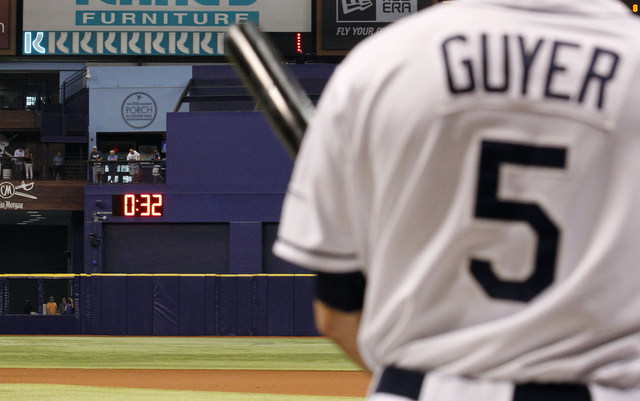Prior to the 2015 season, MLB implemented a series of rule changes designed to improve the pace of play. The rule changes were not necessarily designed to reduce the time of game, but reduce the downtime within a game. Let standing around between pitches, that sort of thing.
Among the rule changes was the stipulation that hitters can not step out of the batter's box after taking a pitch. April and May were used an adjustment period, but after that players were fined if they stepped out. Also, a clock was installed to ensure play began promptly following a commercial break.
According to the Associated Press, the new pace of play measures shaved six minutes off the average time of game in 2015. The average game lasted two hours and 56 minutes this season, though it was two hours and 53 minutes in the first half and an even three hours in the second half. Extra pitching changes with September call-ups surely contributed to that.
MLB tested a pitch clock at the Double A and Triple A levels in 2015, and it helped greatly reduce the average time of game. From the Associated Press:
Triple-A and Double-A leagues, the highest levels of the minors, used 20-second pitch clocks and started penalizing violators with balls and strikes. At Triple-A, the International League average dropped 16 minutes to 2:40 and the Pacific Coast League fell 13 minutes to 2:45.
MLB may pursue a pitch clock at the MLB level in the near future, but there have not yet been serious discussions about it. The MLBPA must sign off on any rule change and thus far players have been resistant to the idea of a pitch clock because they don't want to be rushed.
As someone who watches an embarrassing amount of baseball, I didn't really notice an improved pace this season. That said, the goal was to improve pace for casual fans, who can be tempted to look down at their phones or change channels while the pitcher is wandering around the mound or the batter is adjusting his gloves.
Commissioner Rob Manfred has pushed for improving pace of play -- I don't consider it a major problem but it can be improved -- and there's no reason to think this year's rule changes will go away. If anything, they were only the beginning.






















